Week beginning 16 May 2022
The SATs are over – Hooray. Sorry that you can’t be in school this week. Here are a range of resources linked to what is happening in class. Don’t forget to get in touch with your class teacher if you need support.
Maths
Follow this sequence of maths learning which is linked to fractions.
Lesson 1: video, worksheet, answers
Lesson 2: video, worksheet, answers
Lesson 3: video, worksheet, answers
Lesson 4: video, worksheet, answers
Lesson 5: video, worksheet, answers
Lesson 6: video, worksheet, answers
Lesson 7: video, worksheet, answers
Lesson 8: video, worksheet, answers
Lesson 9: video, worksheet, answers
You don’t have to print the worksheet. Your child can write or draw their answers on paper. Your child’s learning will be most effective if you sit with them to pause the clip and check / praise / support your child as the clip moves on.
Practise times tables on Times Table Rockstars, too. Email the class teacher if you need your child’s login and password details.
(Suggested time: 30 minutes of Maths and 15 minutes of Rockstars daily)
Spelling
Look on the homework page to find this week’s spellings. They should choose some past spellings that they feel less confident with. Your child should complete one task each day.
- Day 1: Generate more words linked to the spelling pattern or ‘rule’. You could look out for the words in the book you’re reading at home, or any other text, like a website linked to our science topic of Living Things and their Habitat.
- Day 2: Practise the spellings using two of the ideas in our Super Spelling Strategies guide. (Set yourself and others at home a challenge of using some of the words when you’re speaking, too!)
- Day 3: Write separate sentences, each containing one of the spellings. (Don’t forget to show off really neat handwriting and make sure you sentence starts with a capital letter and ends with a full stop, exclamation mark (!) or question mark (?).
- Day 4: Repeat Task 2 or 3.
- Day 5: Get an adult at home to test you on your spellings. Practise any you spell incorrectly – you could write them out carefully until you’re sure.
(Suggested time: 15-20 minutes daily)
Reading fluency.
This is the text that we will be using in school. In school, we generally follow this sequence:
- Day 1: Read the text aloud with your child listening. Read it clearly and slowly, pointing to each word as you read. Have a chat about any unfamiliar words.
- Day 2: Read aloud each sentence (a full short sentence or part of a longer sentence), and have your child read it back to you. Do this ‘echo reading’ for the whole text.
- Day 3: Read the text and talk about the effect of the punctuation on how you read it – pauses for full stops and expression for exclamations (!) or questions (?). Your child reads the text aloud.
- Day 4: Read together with expression (just like you practised on Day 3).
- Day 5: Your child reads independently and fluently.
(Suggested time: 15 minutes daily)
Reading comprehension
We’ll be using this RIC text in class to practise comprehension skills. RIC stands for:
- Retrieve: finding information in a text
- Interpret: using clues in the text to unlock information
- Choice: thinking about the author’s choice of words, techniques or organisation that make the text interesting and enjoyable to read
At school, we like to promote a passion for reading. This website has a range of extracts and interviews with different authors. Choose one author each day and read an extract from their book. If you like it, carry out your own research on the author and book.
(Suggested time: 30 minutes daily)
Writing
In writing, we will be reviewing how punctuation is used correctly in our writing. Follow this sequence of lessons on punctuation. There’s a whole series of lessons, but start at Lesson 1 and work through, doing one (or maybe even two) each day. (If you’re self-isolating in your second week, stick with the series of lessons you’ve already started and aim to complete the full series.) Finished? Try this mixed grammar practice.
(Suggested time: 30-40 minutes for each)
Topic
Our topic this half-term is Explorers. In school, we’ll be comparing an area of South America with that of the UK.
Follow these lessons on Building Locational Knowledge: South America from Oak Academy. Follow the lesson sequence. It has 4 lessons so you could do two a week. We’ll also be looking at different biomes.
(Suggested time: 30-40 minutes)
Science
This term is all about electricity.
These six lessons from Oak Academy link closely to what we’ll be doing in class this half term. Start at Lesson 1 and work through, doing two or three in the week.
If Science really motivates your child, you could also use look at these lessons all about practical Science.
(Suggested time: 30-45 minutes)
PE
Don’t forget to do some daily exercise!
Do two or three of these Five Minute Moves from Joe Wicks each day – spread them across the day as if they were playtimes, maybe!
Try working through this series of 25 lessons from the Association for Physical Education – do two or three in the week.
(Suggested time: 5 minutes daily, plus 30 minutes for the longer PE lessons)
Extra stuff…
As an extra (or as an alternative, if this helps to motivate your child)…
Geography is our topic-driver this half-term so you could brush up on your locational knowledge. You could explore some online maps and try to memorise some new countries, capitals, rivers and mountain ranges. These three lessons about Europe are worth checking out.
What about some Living and Learning? While you’re away from school, you could check out these lessons on money!
Week beginning 16 May 2022
It’s the penultimate week before the half term break. Sorry that you can’t be in school this week. Here are a range of resources linked to what is happening in class. Don’t forget to get in touch with your class teacher if you need support.
Maths
Follow this sequence of maths learning which is linked to fractions.
Lesson 1: video, worksheet, answers
Lesson 2: video, worksheet, answers
Lesson 3: video, worksheet, answers
Lesson 4: video, worksheet, answers
Lesson 5: video, worksheet, answers
Lesson 6: video, worksheet, answers
Lesson 7: video, worksheet, answers
Lesson 8: video, worksheet, answers
Lesson 9: video, worksheet, answers
Lesson 10: video, worksheet, answers
You don’t have to print the worksheet. Your child can write or draw their answers on paper. Your child’s learning will be most effective if you sit with them to pause the clip and check / praise / support your child as the clip moves on.
Practise times tables on Times Table Rockstars, too. Email the class teacher if you need your child’s login and password details.
(Suggested time: 30 minutes of Maths and 15 minutes of Rockstars daily)
Spelling
Look on the homework page to find this week’s spellings. They should choose some past spellings that they feel less confident with. Your child should complete one task each day.
- Day 1: Generate more words linked to the spelling pattern or ‘rule’. You could look out for the words in the book you’re reading at home, or any other text, like a website linked to our science topic of Living Things and their Habitat.
- Day 2: Practise the spellings using two of the ideas in our Super Spelling Strategies guide. (Set yourself and others at home a challenge of using some of the words when you’re speaking, too!)
- Day 3: Write separate sentences, each containing one of the spellings. (Don’t forget to show off really neat handwriting and make sure you sentence starts with a capital letter and ends with a full stop, exclamation mark (!) or question mark (?).
- Day 4: Repeat Task 2 or 3.
- Day 5: Get an adult at home to test you on your spellings. Practise any you spell incorrectly – you could write them out carefully until you’re sure.
(Suggested time: 15-20 minutes daily)
Reading fluency.
This is the text that we will be using in school. In school, we generally follow this sequence:
- Day 1: Read the text aloud with your child listening. Read it clearly and slowly, pointing to each word as you read. Have a chat about any unfamiliar words.
- Day 2: Read aloud each sentence (a full short sentence or part of a longer sentence), and have your child read it back to you. Do this ‘echo reading’ for the whole text.
- Day 3: Read the text and talk about the effect of the punctuation on how you read it – pauses for full stops and expression for exclamations (!) or questions (?). Your child reads the text aloud.
- Day 4: Read together with expression (just like you practised on Day 3).
- Day 5: Your child reads independently and fluently.
(Suggested time: 15 minutes daily)
Reading comprehension
We’ll be using this RIC text in class to practise comprehension skills. RIC stands for:
- Retrieve: finding information in a text
- Interpret: using clues in the text to unlock information
- Choice: thinking about the author’s choice of words, techniques or organisation that make the text interesting and enjoyable to read
At school, we like to promote a passion for reading. This website has a range of extracts and interviews with different authors. Choose one author each day and read an extract from their book. If you like it, carry out your own research on the author and book.
(Suggested time: 30 minutes daily)
Writing
In writing, we will be reviewing how punctuation is used correctly in our writing. Follow this sequence of lessons on punctuation. There’s a whole series of lessons, but start at Lesson 1 and work through, doing one (or maybe even two) each day. (If you’re self-isolating in your second week, stick with the series of lessons you’ve already started and aim to complete the full series.) Finished? Try this mixed grammar practice.
(Suggested time: 30-40 minutes for each)
Topic
Our topic this half-term is Explorers. In school, we’ll be comparing an area of South America with that of the UK.
Follow these lessons on Building Locational Knowledge: South America from Oak Academy. Follow the lesson sequence. It has 4 lessons so you could do two a week. We’ll also be looking at different biomes.
(Suggested time: 30-40 minutes)
Science
This term is all about electricity.
These six lessons from Oak Academy link closely to what we’ll be doing in class this half term. Start at Lesson 1 and work through, doing two or three in the week.
If Science really motivates your child, you could also use look at these lessons all about practical Science.
(Suggested time: 30-45 minutes)
PE
Don’t forget to do some daily exercise!
Do two or three of these Five Minute Moves from Joe Wicks each day – spread them across the day as if they were playtimes, maybe!
Try working through this series of 25 lessons from the Association for Physical Education – do two or three in the week.
(Suggested time: 5 minutes daily, plus 30 minutes for the longer PE lessons)
Extra stuff…
As an extra (or as an alternative, if this helps to motivate your child)…
Geography is our topic-driver this half-term so you could brush up on your locational knowledge. You could explore some online maps and try to memorise some new countries, capitals, rivers and mountain ranges. These three lessons about Europe are worth checking out.
What about some Living and Learning? While you’re away from school, you could check out these lessons on money!
Week beginning 16 May 2022
Hi everyone
We hope you’re feeling happy and healthy at home. We miss having you in school but we want you to know that you’re still very much part of our school community. Enjoy your home learning for this week.
Maths
Follow this sequence of maths learning which is linked to decimals.
- Lesson 1: video, worksheet, answers
- Lesson 2: video, worksheet, answers
- Lesson 3: video, worksheet, answers
- Lesson 4: video, worksheet, answers
- Lesson 5: video, worksheet, answers
- Lesson 6: video, worksheet, answers
- Lesson 7: video, worksheet, answers
- Lesson 8: video, worksheet, answers
- Lesson 9: video, worksheet, answers
Lesson 10: video, worksheet, answers
You don’t have to print the worksheet. Your child can write or draw their answers on paper. Your child’s learning will be most effective if you sit with them to pause the clip and check / praise / support your child as the clip moves on.
Practise times tables on Times Table Rockstars, too. If your child is in Y3, we’re concentrating on the 8 times table. If your child is in Y4, we’re concentrating on all times tables up to and including 12 x 12. Email the class teacher if you need your child’s login and password details.
(Suggested time: 30 minutes of Maths and 15 minutes of Rockstars daily)
Spelling
Look on the homework page to find this week’s spellings. They should choose some past spellings that they feel less confident with. Your child should complete one task each day.
- Day 1: Generate more words linked to the spelling pattern or ‘rule’. You could look out for the words in the book you’re reading at home, or any other text, like a website linked to our science topic of Living Things and their Habitat.
- Day 2: Practise the spellings using two of the ideas in our Super Spelling Strategies guide. (Set yourself and others at home a challenge of using some of the words when you’re speaking, too!)
- Day 3: Write separate sentences, each containing one of the spellings. (Don’t forget to show off really neat handwriting and make sure you sentence starts with a capital letter and ends with a full stop, exclamation mark (!) or question mark (?).
- Day 4: Repeat Task 2 or 3.
- Day 5: Get an adult at home to test you on your spellings. Practise any you spell incorrectly – you could write them out carefully until you’re sure.
(Suggested time: 15-20 minutes daily)
Reading fluency
This is the text we’re using in class this week to build up fluency skills.
In school, we generally follow this sequence:
- Day 1: Read the text aloud with your child listening. Read it clearly and slowly, pointing to each word as you read. Have a chat about any unfamiliar words.
- Day 2: Read aloud each sentence (a full short sentence or part of a longer sentence), and have your child read it back to you. Do this ‘echo reading’ for the whole text.
- Day 3: Read the text and talk about the effect of the punctuation on how you read it – pauses for full stops and expression for exclamations (!) or questions (?). Your child reads the text aloud.
- Day 4: Read together with expression (just like you practised on Day 3).
- Day 5: Your child reads independently and fluently.
(Suggested time: 15 minutes daily)
Reading comprehension
We’ll be using this RIC text in class to practise comprehension skills. RIC stands for:
- Retrieve: finding information in a text
- Interpret: using clues in the text to unlock information
- Choice: thinking about the author’s choice of words, techniques or organisation that make the text interesting and enjoyable to read
Follow these lessons from Oak National Academy. There’s a whole series of lessons, but start at Lesson 1 and work through, doing one (or maybe even two) each day. (If you’re self-isolating in your second week, stick with the series of lessons you’ve already started and aim to complete the full series.)
(Suggested time: 30 minutes daily)
Writing
Follow these lessons from Oak National Academy. There’s a whole series of lessons, but start at Lesson 1 and work through, doing one (or maybe even two) each day. (If you’re self-isolating in your second week, stick with the series of lessons you’ve already started and aim to complete the full series.)
(Suggested time: 30-40 minutes for each)
Topic
Our topic this half-term is about geography.
Follow these lesson from Oak National Academy: Europe, UK, and hemispheres. There’s a whole series of lessons, but start at Lesson 1 and work through, doing one (or maybe even two) each day. (If you’re self-isolating in your second week, stick with the series of lessons you’ve already started and aim to complete the full series.)
(Suggested time: 30-40 minutes)
Science
Our focus this half-term is about plants.
These six lessons from Oak National Academy link closely to what we’ve been doing in class. Start at Lesson 1 and work through, doing two or three in the week. If you’ve previously completed on of these lessons, have a go at the ones you haven’t completed yet.
If Science really motivates your child, you could also use look at these lessons all about practical Science.
(Suggested time: 30-45 minutes)
PE
Don’t forget to do some daily exercise!
Do two or three of these Five Minute Moves from Joe Wicks each day – spread them across the day as if they were playtimes, maybe!
Try working through this series of 25 lessons from the Association for Physical Education – do two or three in the week.
(Suggested time: 5 minutes daily, plus 30 minutes for the longer PE lessons)
Extra stuff…
As an extra (or as an alternative, if this helps to motivate your child)…
Fancy learning about a new religion? You don’t have to be religious to learn about, and appreciate, religions from all around the world. Check out this set of lessons from Oak National Academy – you could choose to focus on one religion or dip into each set for an overview.
What about some music? Choose one of these units and work through it on Oak National Academy.
13 May 2022
Y1: have live give love was
Y2: race ice cell city fancy knock know knee gnat gnaw
13 May 2022
This week’s Talk Time has a Living and Learning focus:
I know what consent is.
Consent forms a part of everyday life: permission to take or publish a photo is a form of consent.
Because matters around consent can occur anywhere, it’s important to consider a range of scenarios. That way, you’ll be able to appreciate how you, or others, might feel in those situations and can think about the words or actions that follow. As a starting point, you could look at the following scenarios and consider how you might respond:
- A friend asks you to play football at playtime but you’re feeling quite tired.
- You and a friend did really well in a quiz so you want to give them a hug.
- You’re getting ready for school and you notice your brother/sister has their jumper on backwards.
- Your teacher wants to take pictures of some pictures of your writing to share with the class.
- You’ve been learning a poem and the teacher would like to record the class to use as part of an assembly.
What other situations can your child think of where consent is important?
When we reviewed our Relationships and Sex Education Policy, very many parents and carers wanted consent to feature more. This is why we’re including consent in our homework. Talking about consent in relation to our own bodies can be appropriate for children of any age.
These R2s will help you in a situation where you’re asking for consent:
- ask for permission
- if that person says yes, great
- if they say no, respect their decision (even if it upsets you)
A lovely week of learning
Everyone’s been very busy this week! We’ve been busy learning all about worms and caterpillars, busy creating fantastic art and busy playing with our friends.
The children have enjoyed making lists of different sorts, including a wonderful list of ‘brown things’. We’ve drawn lots of different worms and talked about their lengths and we’ve also continued to develop our understanding of ‘one more’ and ‘one less’. We’ve been on another minibeast hunt and looked at different ways of sorting these fabulous creatures. We discovered that some have no legs, some have many legs and some have wings (and some have many legs AND wings). Our class caterpillars have been growing and changing each day and we’ve started to talk about their life cycles. Our focus book is currently ‘The Very Hungry Caterpillar’ and we’ll be creating some Eric Carle-inspired art next week.
We hope that the weather will be kind to our beans and herbs and they will grow taller and stronger in the sunshine. Hopefully, we’ll have a tasting session soon.
Dates for your diary:
27.05.22 – Jubilee day. Please bring your child to school dressed in red, white and blue to help us celebrate the Queen’s Platinum Jubilee.

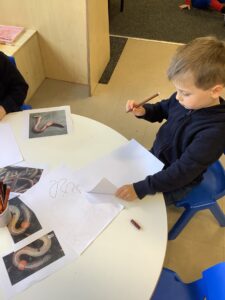
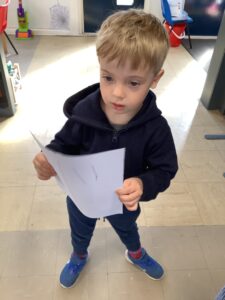
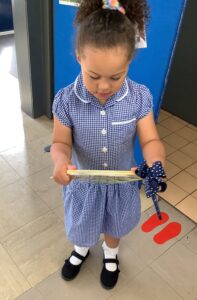
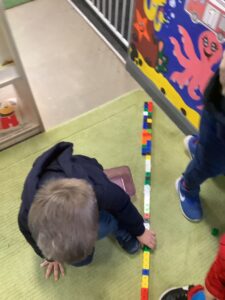

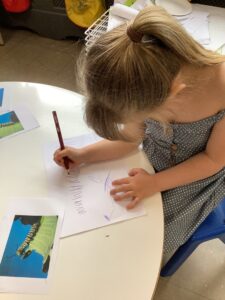
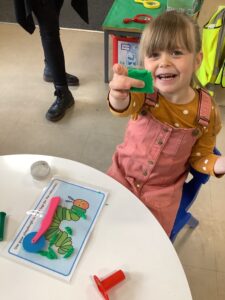
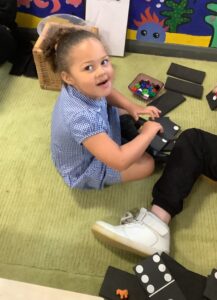
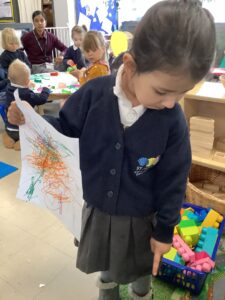
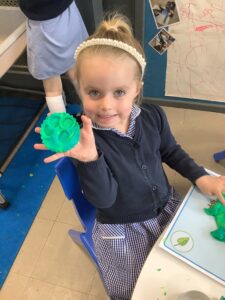
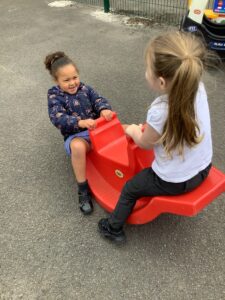
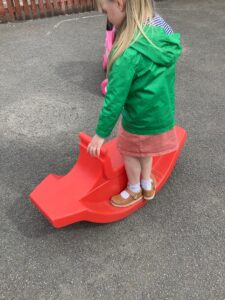
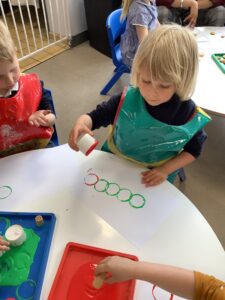
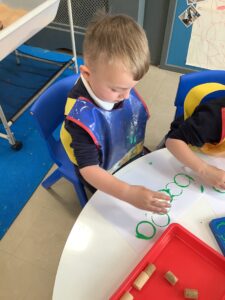
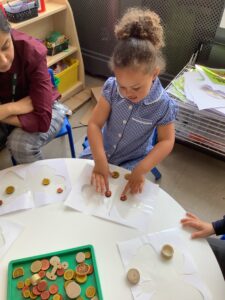
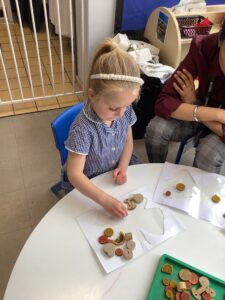
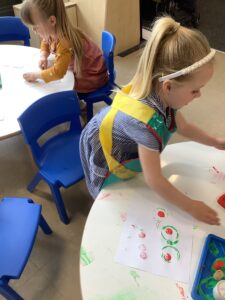
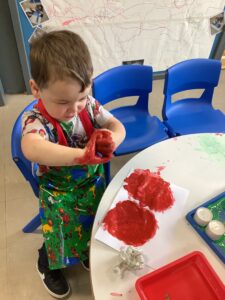
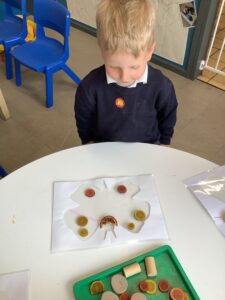
Amazing animals!
In Literacy, we’ve been reading Walking through the Jungle. We had lots of fun using actions to help us remember the story. Click here to watch us!
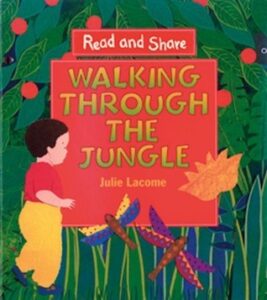
The book led us onto learning about rainforests and where they are in the world. We learnt about different types of animals and why tropical rainforests are so warm.
Ask your child if they can remember a fact about rainforests.
In Maths, we continued to develop our understanding of composition of numbers to 10 through games and practical experiences, such as investigating different ways to represent 10 sausages from the counting rhyme, ‘10 Fat Sausages’. Composing and de-composing numbers involves the children investigating part–part–whole relations, e.g. seeing that 7 can be made of 5 and 2 more. We used our fingers, Numicon and counters to help us explore this.
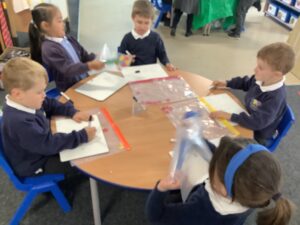
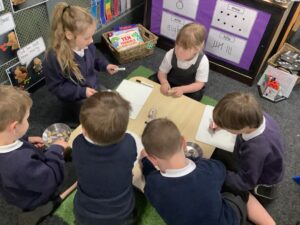
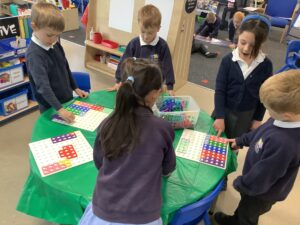
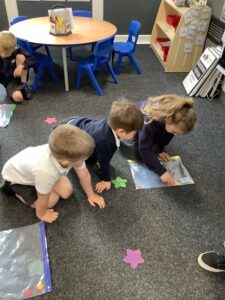
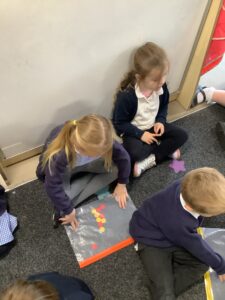 We finally got to make fruit kebabs!
We finally got to make fruit kebabs!
They were so excited when they saw the fruit on Monday morning.
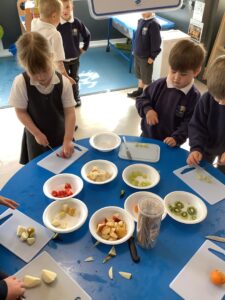
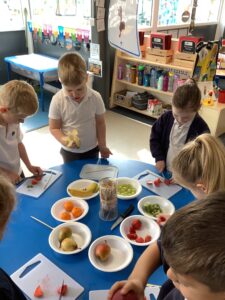
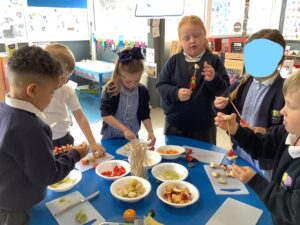
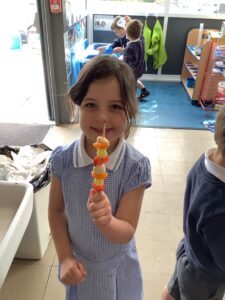
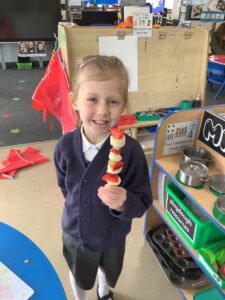
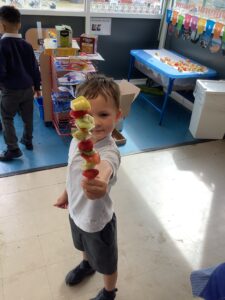
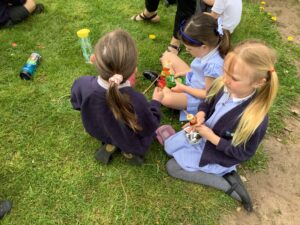 They loved their fruit kebabs that much, they asked for more!
They loved their fruit kebabs that much, they asked for more!
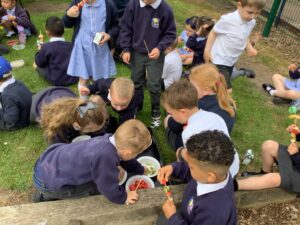
On Tuesday, Mrs Rippon and AM picked two radishes from our vegetable patch. They washed them so we could try some at snack time. Let’s just say it wasn’t very popular!
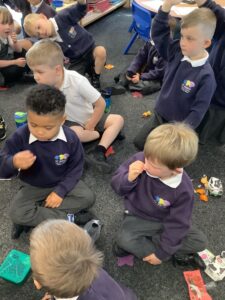
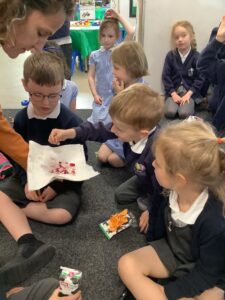
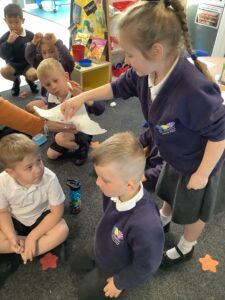 Home-Link Challenge
Home-Link Challenge
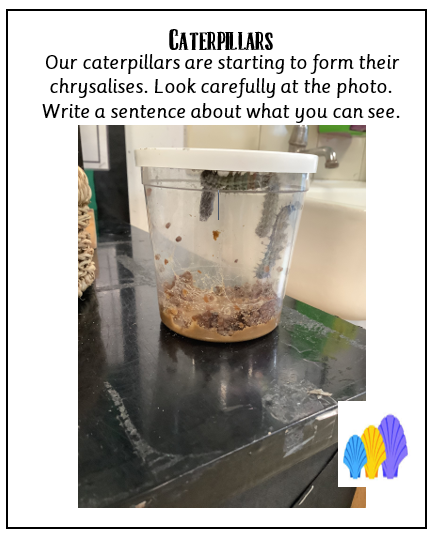
This week’s message (Thursday 12 May 2022)
This week, we’ve seen the end of Key Stage 2 SATs for our Year 6 children. Because of the need for extra adults and rooms in school, it’s a week that affects everyone. We know our Year 6 pupils approached the tests admirably and are very deserving of their day off tomorrow! It’s a training day – staff in school will be developing their phonics knowledge and skills.
Happy and healthy and hydrated
We teach our children about the importance of drinking water. We actively encourage them to take drinks throughout the day. Please make sure your child brings in their water bottle each day, and then take it home and wash it regularly. Water is provided at lunchtime for all children, whether they’re having a school dinner or a packed lunch. Please note: at school, children are allowed only to drink water – the healthiest choice.
Happy and healthy and active
Did you know May is National Walking Month? The evenings are getting lighter, the weather is getting warmer – it’s the perfect time to get outside and get walking. It’s not too late to take up the challenge: walk for 20 minutes every day. And walking to and from school is the ideal opportunity to achieve this!
Health advice
Are you aware there’s a rise in cases of hepatitis amongst children? No one’s quite sure yet why we’re seeing this rise in hepatitis (liver inflammation).
Be alert to the signs of hepatitis:
- yellowing of the white part of the eyes or skin (jaundice)
- dark urine
- pale, grey-coloured faeces (poo)
- itchy skin
- muscle and joint pain
- a high temperature
- feeling and being sick
- feeling unusually tired all the time
- loss of appetite
- tummy pain
If you’re concerned, contact a health care professional.
Good hygiene, including supervising hand washing in young children, can help to prevent infections that can cause hepatitis.
Children experiencing symptoms of a gastrointestinal infection including vomiting and diarrhoea should stay at home and not return to school until 48 hours after the symptoms have stopped. This is our regular advice to parents.
Leeds is outstanding
Have you heard the news? Ofsted has once again rated children’s services provided by Leeds City Council as ‘outstanding’.
The outstanding rating, previously received in 2018, comes following a rigorous inspection into services for the most vulnerable children and young people – those children in need of help and protection, children in care and care leavers.
We started this week’s message with reference to the training day tomorrow. Whatever you get up to tomorrow, and throughout the weekend, enjoy!
RE: How do The Five Pillars guide Muslims in life?
This half term, in RE, the children are studying the Islamic religion.
- recognise some of the key teachings of Islam
- make links with the ways beliefs can affect decisions
- give reasons on how being a Muslim can effect a believer’s life.
Throughout these lessons, there will opportunities for some spiritual, moral and cultural development. The children will think about the ways Muslims show their commitment to God, and look for links to their own lives. We will investigate the pillars of Islam and the impact they have on the wider world. For some cultural development, we will explore where Muslims worship.
Hopefully, the children will get an opportunity to meet and engage with someone from the local Muslim community.
Today, the children looked closely at some Islamic artefacts. Pupils worked in groups to investigate the meaning and significance of their artefacts.
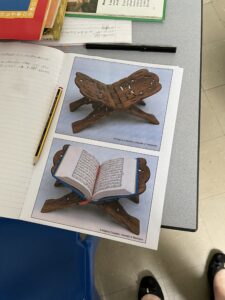
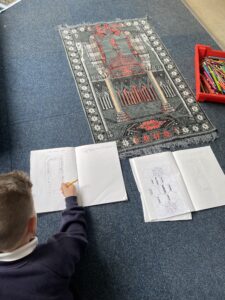
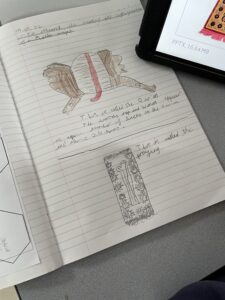
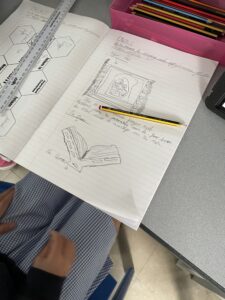
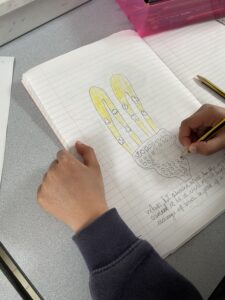
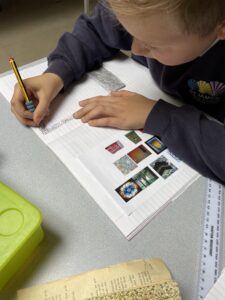

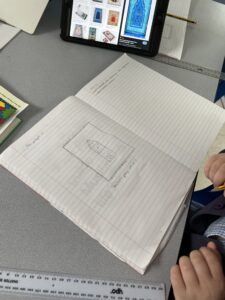
Ask your child about their artefact.
- What was it?
- What did it represent?
This week’s bible story
Jacob steals Esau’s blessing: Genesis 27
The bible says that Peace comes through forgiveness and repentance (saying sorry).
Read the story about Jacob and Esau and see how they were not at peace with each other. After Jacob had stolen Esau’s birth right, he ran away and the brothers lived apart for many years.
Reflection:
How could he be at peace with his brother, when he had done so many wrong things? Would they be able to live peacefully? When they met, Jacob tried to give Esau gifts, but Esau just forgave him. This is a beautiful example of peace between two brothers after years of being angry and apart!
Prayer:
Dear God,
Thank you that there are examples in the bible where we can see peace between family and friends. Help us to be at peace with our friends and family.
Amen